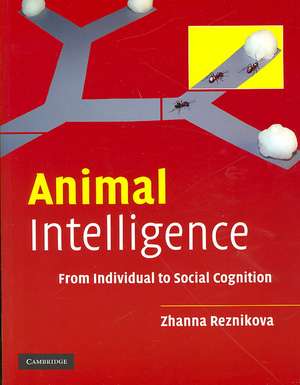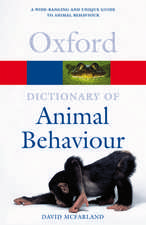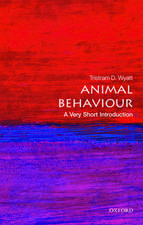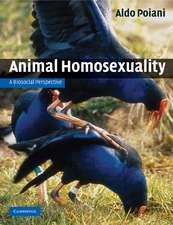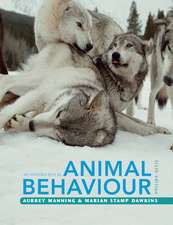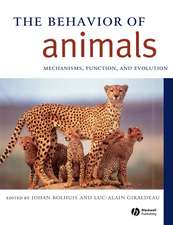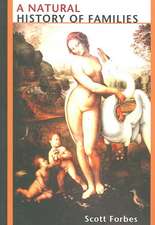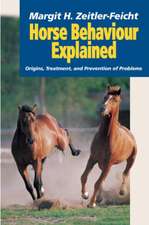Animal Intelligence: From Individual to Social Cognition
Autor Zhanna Reznikovaen Limba Engleză Paperback – 15 aug 2007
Preț: 545.13 lei
Preț vechi: 612.51 lei
-11% Nou
Puncte Express: 818
Preț estimativ în valută:
104.34€ • 113.38$ • 87.71£
104.34€ • 113.38$ • 87.71£
Carte tipărită la comandă
Livrare economică 21 aprilie-05 mai
Preluare comenzi: 021 569.72.76
Specificații
ISBN-13: 9780521532020
ISBN-10: 0521532027
Pagini: 488
Ilustrații: 123 b/w illus.
Dimensiuni: 188 x 246 x 30 mm
Greutate: 0.86 kg
Editura: Cambridge University Press
Colecția Cambridge University Press
Locul publicării:Cambridge, United Kingdom
ISBN-10: 0521532027
Pagini: 488
Ilustrații: 123 b/w illus.
Dimensiuni: 188 x 246 x 30 mm
Greutate: 0.86 kg
Editura: Cambridge University Press
Colecția Cambridge University Press
Locul publicării:Cambridge, United Kingdom
Cuprins
Part I. Development of Ideas and Methods in Studying Animal Intelligence: 1. Evolution of views on animal intelligence; 2. Dramatic adventures of behaviourism; 3. Intelligence under a scalpel: starts and false starts of neuroscience; 4. Integrative approaches and coherent movement in studying animal intelligence; 5. Ethological approaches for studying animal learning; Part II. Animals are Welcome to the Class: Learning Classes: 6. Habituation and associative learning; 7. Learning classes beyond 'simple' associative learning; Part III. Past and Future in Animal Life: Remembering, Updating and Anticipation: 8. What memory is for an intelligent animal? 9. Chicks do not suffer from schizophrenia: briefly about brain mechanisms for processing and storing memory; 10. Behavioural mechanisms of experience of time; Part IV. To be in Time in the Right Place: Representation of Space and Objects in Animal Mind: 11. Navigation strategies in animals; 12. To what degree mapping is cognitive in animals? 13. 'Object permanence' in animals; Part V. Experimental Approaches to Studying Essential Activities of Animal Intelligence: 14. Conditional discrimination as a basic technique for studying rule learning; 15. Categorisation, abstraction, and concept formation: are animals logical?; 16. Conceptual behaviour based on relations; Part VI. Advanced Intelligence in Animals: Rule Extraction, Tool Using and Number Related Skills: 17. Insightful behaviour; 18. Tool using as a tool for experimental studying of animal intelligence; 19. Numerical competence in animals; Part VII. Knowledge is Power but not for all: Species-Specific Intelligence: 20. Is finding a common metric of intelligence possible in real animal life?; 21. A sketch on instinctive behaviour; 22. Guided learning and cognitive specialisation; 23. Developmental studies of animal intelligence: role of innate and acquired behaviour; 24. Imprinting; Part VIII. The Wisdom by Social Learning: 25. Ecological and cognitive aspects of social learning; 26. The spread of innovation within populations; 27. Culture in animal societies; Part IX. Intelligent Communication: 28. Can animals exchange meaningful messages?; 29. Communication, speech and language: what falls to the share of non humans?; 30. Direct dialogue with animals: language-training experiments; 31. A battle for the Rosetta Stone: attempts to decipher animals' signals; 32. A dialogue with a black box: using of ideas and methods of information theory for studying animal communication; Part X. Social Life and Social Intelligence in the wild: 33. Diversity of social systems in animals; 34. Evolutionary and behavioural aspects of altruism in animals; 35. Intelligence in a context of the functional structure of animals' communities; 36. What sort of intelligence is required to navigate social landscapes?; 37. Theory of mind.
Recenzii
'… the style is refined and easy to follow. … the overall impression is of remarkable authority and a profound understanding by the author of how animals work.' Biologist
Notă biografică
Descriere
A multi-faceted panorama of animal intelligence and how it works in nature.
